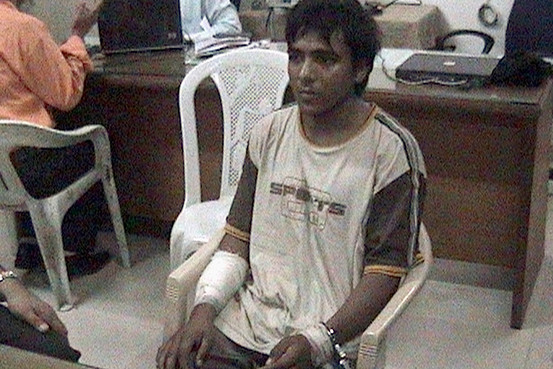Tripoli, Libya (Bloomberg): French and British forces struck Muammar Qaddafi’s ground forces as NATO agreed to take command of the Libya no-fly zone without assuming responsibility for air strikes against military targets.
A French jet destroyed an artillery battery in the central town of Ajdabiya, French Admiral Edouard Guillaud said on France Info radio. British Tornado jets carried out missile strikes on armored vehicles threatening Ajdabiya, where rebels were routed earlier this month, the British Defense Ministry said today.
 “Libya’s air space is under control,” said Guillaud, the chief of France’s defense staff.
“Libya’s air space is under control,” said Guillaud, the chief of France’s defense staff.
With coalition attacks in their seventh day, Qatar is sending planes to help enforce the no-fly zone, becoming the first Arab participant, and the United Arab Emirates pledged to join, reversing an earlier decision. The allies are taking aim at Qaddafi’s armored units, military facilities and supply lines after crippling his air force.
Oil prices have jumped about 25 percent since the Libyan rebellion began last month, heightening concerns about Middle East crude supplies. The revolt has evolved from the kind popular uprising seen in Egypt and Tunisia into a civil war.
Elsewhere, Syria said it may end emergency rule and grant more freedom for political parties, in response to protests that reportedly left many dead. In Yemen, the political opposition to President Ali Abdullah Saleh plans a nationwide protest against the state of emergency ordered by the president after a massacre of demonstrators last week. In Bahrain, mostly Shiite Muslim opposition supporters plan a rally to denounce government violence that has left about 20 of them dead.
Oil Rises
Oil rose 0.3 percent to $105.86 a barrel, near the highest in 2 ½ years, at 10:20 a.m. today in London.
The U.S. and allies such as France and the U.K. are enforcing a United Nations mandate to protect Libyan civilians, though leaders have called for Qaddafi’s ouster and seek to roll back his forces in cities such as Misrata, Ajdabiya and Zentan.
The agreement among members of the North Atlantic Treaty Organization allays discord within the 28-member alliance and means the U.S. will likely stay in charge of the attacks on Qaddafi’s forces.
Western-led planes attacked an air base in Sabha, a city in Libya’s interior on the edge of the Sahara Desert that operates as a transit point to the south, U.S. Army General Carter Ham told reporters yesterday at a Naval base in Sigonella, Italy.
Expanding Targets
While the coalition has broadened targets beyond air facilities to ammunition depots and fuel supplies, commanders have had difficulty targeting military forces directly because they’re located near civilians, Ham said.
“We are having an effect on command-and-control facilities, though we do recognize and see that there is still some capacity for the regime to exercise control of its military forces,” Ham said, according to a statement on the military’s website.
The anti-Qaddafi coalition flew 130 sorties in a 24-hour period, of which 49 were sent to hit ground targets, and launched 14 Tomahawk cruise missiles against Libyan air-defense and missile sites, Vice Admiral Bill Gortney of the U.S. Joint Chiefs of Staffs said yesterday.
French officials, who pushed hardest for military action, yesterday predicted a quick end to the conflict. Foreign Minister Alain Juppe said the “military action will be counted in days and in weeks, not in months.”
Wavering Seen
Defense Minister Gerard Longuet said the coalition has intercepted conversations among Libyan officers indicating that many are ready to abandon the regime.
UN Secretary General Ban Ki-moon said he expects Libyan government and opposition representatives to hold cease-fire talks today under African Union auspices in Addis Ababa, Ethiopia.
NATO’s role will be limited for now to the no-fly zone, said Anders Fogh Rasmussen, its secretary general.
“We have not decided yet whether we will take on a broader responsibility,” Rasmussen said in an interview on CNN.
The alliance will take over command of the no-fly-zone operations in one or two days, according to a U.S. administration official authorized to brief reporters on the condition his name not be used.
Secretary of State Hillary Clinton, after talks with foreign ministers from NATO members Turkey, France and the U.K., said that the alliance would further consider plans to assume command of ground-strike missions. Turkey, a majority-Muslim nation, and Germany have publicly questioned NATO taking on a combat role in Libya. Germany this week pulled two frigates and two other ships from NATO operations in the Mediterranean.
Special Forces
U.K. Foreign Secretary William Hague reaffirmed that there will be no invasion of Libya by Western countries, though he said he “can’t exclude” the small-scale use of special forces on the ground.
The United Arab Emirates said today it will send six F-16 and six Mirage jets to help enforce the zone, reversing an earlier decision to take part in humanitarian aid missions only, the state-run WAM news agency said.




